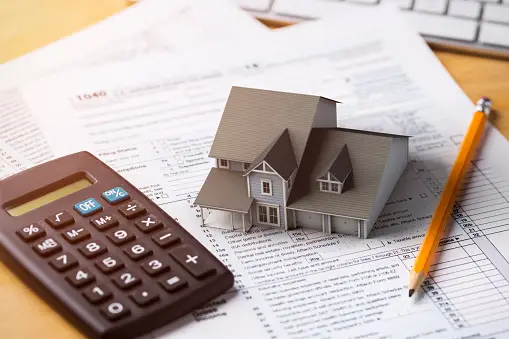What Credit Score Do I Need to Buy a House?
Oct 14, 2023 By Susan Kelly
Are you getting ready to buy a house and wondering what credit score you need? Purchasing a home is one of the most significant financial investments someone can make, so it's important to ensure that your finances are in order before taking the plunge.
Knowing what kind of credit score is needed for purchasing a home can be challenging, but understanding what factors determine your scores can help you meet the requirements. We'll discuss the credit score needed to purchase a home and provide tips on working toward that goal.
What is a Credit Score, and Why is it Important when Purchasing a House

Your credit score is a three-digit number that lenders use to evaluate your financial health. It's based on the information in your credit report, which includes details of how much debt you have, how long you've had it, and whether or not you've made payments on time.
When buying a home, your credit score is important for several reasons. First, having a good credit score helps qualify you for lower interest rates, saving you money over the life of your loan. Second, lenders want to ensure they are lending to responsible borrowers who will repay their loans in full and on time.
What Credit Score Do I Need To Buy A House?

Different lenders have different standards and may require different scores depending on the type of loan or down payment amount. Generally speaking, borrowers with higher credit scores will have an easier time qualifying for a loan and obtaining better interest rates.
It's important to note that even if you meet the minimum credit score requirement, other factors can influence whether or not you are approved for an home loan, such as your debt-to-income ratio (DTI), employment history, income level, and more. Speaking with multiple lenders and getting pre-approved before making major decisions is best.
Conventional Loans Minimum Credit Score: 620-640
Conventional loans are typically the most common type and require a credit score of at least 620 to 640. These loans can be used for primary residences, second homes, or investment properties. The higher your credit score is, the more likely you are to get approved and the better interest rates you will receive.
FHA Loans Minimum Credit Score: 580-620
FHA loans are government-backed mortgages that allow lower down payments and sometimes have looser qualifying requirements than conventional loans. To qualify for an FHA loan, borrowers usually have a minimum credit score of 580 to 620.
Jumbo Loans Minimum Credit Score: 700
Jumbo loans are large mortgage loans that exceed the maximum loan amounts set by the Federal Housing Finance Agency. To qualify for a jumbo loan, borrowers usually need a credit score of 700 or higher.
FHA Loans Minimum Credit Score: 500-579
FHA loans are available to borrowers with credit scores as low as 500, but these loans usually require a higher down payment of at least 10% and often require the borrower to pay for private mortgage insurance.
VA Loans Minimum Credit Score: 620
VA loans are special programs offered to eligible active military members and veterans. Most lenders require a minimum credit score of 620 to qualify for a VA loan.
Ways to Improve Your Credit Score Before Buying a House
Buying a house is a significant financial commitment, so it's important to ensure your credit score is in the best shape before applying for a home loan. Here are some ways you can improve your credit score:
• Make timely payments
• Reduce debt and keep balances low
• Don't open too many new accounts at once
• Check your credit report for errors and correct them if needed
• Pay off collections and other delinquent items on your report
• Don't close old accounts unless necessary
By following these tips, you can put yourself in the best position possible to get approved for a home loan with favorable terms. It may take time and effort, but it's worth it in the long run.
Different Credit Scoring Models
There are several different models used to calculate credit scores.
- The FICO Score is the most commonly used credit score developed by Fair Isaac Corporation. It ranges from 300 to 850, with higher scores indicating a better credit history.
- VantageScore was created by the three major credit bureaus (Equifax, Experian, and TransUnion) in 2006 and ranged from 501 to 990, with higher scores indicating a better credit history. Experian created the PLUS Score model to predict a consumer's likelihood of becoming delinquent on their loan payments over the next 24 months and ranges from 330 to 830, again with higher scores indicating a lower risk of delinquency.
No matter which scoring model you use, knowing what credit score you need to purchase a house is important. It's also essential to understand the factors determining your credit score to ensure the necessary steps to meet the minimum requirements for home loans. You can reach that goal in no time with a little bit of hard work and dedication.
How Your Credit Score Affects Mortgage Rates
Your credit score plays a big role in determining your mortgage rate. Generally, borrowers with higher credit scores receive lower interest rates and better loan terms than those with lower scores.
The difference between a good rate and an excellent one can add up to thousands of dollars over the life of the loan, so it's important to ensure your credit is in top shape before applying for a home loan.
If you have any doubts about whether or not you qualify for a loan with favorable terms, feel free to speak to several lenders and compare their offers. Doing so could save you money and put you on the right track toward owning your dream home.
FAQS
How much can you borrow with a 700 credit score?
The amount you can borrow with a 700 credit score will depend on the lender and the type of loan you are applying for. Generally, borrowers with higher credit scores receive more favorable terms, such as lower interest rates.
Is an 800 credit score rare?
No, an 800 credit score is not rare. While it's still considered excellent and will likely get you better loan terms, it's achievable with the right steps.
What credit score do I need to buy a house with no money down?
The minimum credit score required to purchase a home with no money down will vary depending on the lender you are working with. Generally, a credit score of 620 or higher is required for such loans.
Conclusion
Buyers need to understand which credit score is best for buying a house. It should also be noted that this article is only an informative summary: if you're buying a house, one of the most important steps is to seek advice from experts in your local market. Remember, even if your credit score falls marginally short of the conventional threshold, alternative options could make homeownership a reality for you. Do not be discouraged by not having an ideal credit score; instead, use it as motivation and an opportunity to learn more about the finances required to qualify for a mortgage loan.

Susan Kelly Jan 27, 2024
Top Mortgage Bankers In Kansas For 2023
58429

Susan Kelly Nov 23, 2023
Credit Score Improvement: Smart and Easy Steps to Building Credit
82012

Triston Martin Nov 30, 2023
Understanding Gap Insurance: A Comprehensive Guide
79972

Triston Martin Feb 03, 2024
Options for Those Struggling to Pay Their Taxes
5176

Susan Kelly Jan 29, 2024
What Is A Multifamily Home
90450

Susan Kelly Oct 03, 2023
What Is The Standard Plan For Repaying Student Loans
8970

Susan Kelly Feb 12, 2024
Hedging vs Speculation: An Overview
35511

Triston Martin Feb 04, 2024
What An Early 401(K) Withdrawal Really Costs When Cashing Out A 401(K)
53915